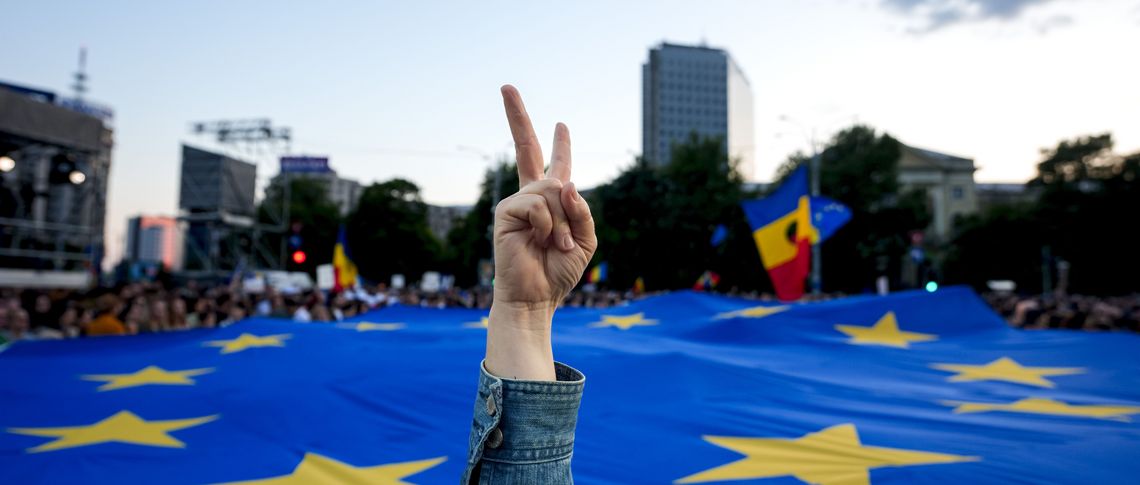On the evening of Romania’s runoff election, the weather seemed to match the political climate: changeable. Rain and sun took turns — a symbol of the uncertainty that had characterised the country in the weeks leading up to the election. Shortly before the first projections were announced, a photo was shared widely on social media: a rainbow stretching across the sky above Bucharest. Many interpreted it as a sign of hope — a fitting signal that lifted the tense mood, at least for a moment.
The election results, which were announced later that evening, underscored this hope. Independent pro-European candidate Nicușor Dan won by a surprisingly clear margin over his ultra-nationalist opponent George Simion, who had been considered the frontrunner in the run-up to the election.
The fact that Dan even made it into the runoff was a surprise in itself. When the results of the first round of the presidential election were announced, most people thought a victory for Dan was highly unlikely. This makes his clear win in the runoff all the more remarkable.
A country divided
Dan had indeed staged a comeback. In the only TV debate between him and Simion, he managed to lay bare the significant differences between himself and his opponent. On the one hand, there was a pro-European, knowledgeable candidate with intellectual stature and moderate positions; on the other, an ultra-conservative enemy of democracy with aggressive rhetoric.
The high turnout was hence no coincidence: at around 65 per cent, it was significantly higher than in the last elections (mostly around 50 per cent). A total of around 11.6 million Romanians cast their votes, including more than 1.6 million from the diaspora. Many people who did not vote in the first round did so in the runoff. Concerns about a Simion presidency were particularly high in cities and among well-educated voters. His nationalist course and his populist rhetoric, which had become even more strident in recent days, had alarmed many — particularly those who support Romania’s European course and democratic stability.
Dan was thus able to mobilise not only his own support base, but also many voters who had preferred other candidates in the first round. He was particularly strong among the Hungarian minority, which Simion had previously attacked with his nationalist rhetoric. In some cases, such as the traditionally Hungarian-populated districts Harghita and Covasna, Dan received over 90 per cent of the vote.
Trust in institutions and democracy is lower in many structurally weak regions, and social inequalities are reflected in political frustration.
The result can also be clearly understood in geographical terms. Dan achieved clear majorities in larger cities and economically stronger regions. In rural areas, however, Simion remained strong. The mobilisation in the country’s urban centres in the last few days before the runoff appears to have played a key role in Dan’s success.
Although this division within Romania is nothing new, it was particularly evident in this election. Trust in institutions and democracy is lower in many structurally weak regions, and social inequalities are reflected in political frustration. The fact that Dan was unable to win over voters here remains one of the key social challenges facing all democratic political actors in the country.
There was also a clear gender divide: women were more likely to vote for Dan (around 60 per cent), while the proportion among men was almost 10 per cent lower. This comes as little surprise given the findings of the latest youth study by the Friedrich-Ebert-Stiftung: young women in Romania are significantly more open to the rights of minorities, LGBTQIA+ people and socially disadvantaged groups than young men. They are more aware of discrimination and call for more government intervention to reduce social inequalities. While the majority of young women support democracy, young men show a greater tendency towards authoritarian governments.
Desire for change
It is noteworthy that no candidate from the established parties made it to the runoff. This was the first election in decades without the participation of the social democratic PSD. Instead, two candidates who are both critical of the system faced off against each other, albeit with very different perspectives. In doing so, Romanian voters have sent a clear signal: they are dissatisfied with the political status quo. Corruption, clientelism and a lack of reforms have all weakened trust in the traditional parties. The desire for political change is great.
Whether there will actually be any change, and if so what form it will take, remains unclear. The president is dependent on cooperation with a government that is capable of taking action. Following the first round of elections, Social Democratic Prime Minister Marcel Ciolacu resigned. One of the new president’s first official acts will be to call for the formation of a new government. It will be crucial to see what role the PSD plays in this. Although it remains the strongest force in parliament, in the past few months, it has lost a lot of support among its own voters and trust among the population — the reason it left the government. But while it is mathematically impossible to organise a democratic majority in parliament without the Social Democrats, their return to government seems unlikely.
This is a victory for all those who want a democratic and European-oriented future for Romania.
In addition to this challenge at the government level, there are considerable economic challenges: the government deficit is extremely high at over nine per cent, and inflation is weighing heavily on lower income groups in particular. Even though Dan has won over voters in the cities, political stability will depend on whether the government succeeds in achieving concrete improvements in rural and economically weaker regions as well.
It is precisely in those areas, where Simion received so many votes, that there is a risk of growing disappointment if nothing changes in people’s everyday lives. If Dan and the incoming government fail to take countermeasures, trust could quickly be lost again.
The election has made it clear that Romania’s political landscape is in flux. Instead of party loyalty, issues such as European orientation, social justice and trust in state institutions are influencing voting behaviour more strongly than before.
For the first time, two candidates with critical views of the system faced each other in the runoff election — and for the first time, a pro-European candidate with no party affiliation and roots in the citizens’ movement won the highest office in the country. This is a victory for all those who want a democratic and European-oriented future for Romania. Now realpolitik must be measured against this and the established parties must prove that they are willing to learn from the election results.
Many Romanians abroad work in poorly paid jobs and see little prospect of returning home. The feeling of being treated as ‘second-class Europeans’ is particularly pronounced there.
Not only in Bucharest, but throughout the rest of Europe, people are breathing a sigh of relief: Romania remains the constructive partner of the EU that it has always been. The election results reflect the country’s strong ties to Europe, which are by no means a given, as the past few months have shown. It is important to nurture this relationship, as the election results in the diaspora clearly demonstrate.
Dan achieved good results in the diaspora, apart from Western Europe. In countries such as Germany and Spain, however, Simion polled at almost 70 per cent. Many Romanians abroad work in poorly paid jobs and see little prospect of returning home. The feeling of being treated as ‘second-class Europeans’ is particularly pronounced there. Support for Simion can therefore be explained by his nationalist rhetoric and his criticism of established politics. Many Romanian emigrants, especially those from the working class, find his message appealing.
The election therefore also sends a clear message to Europe’s partners: it is crucial that countries such as Romania, which play a central role in the functioning of the EU, are not only noticed when their commitment to Europe is called into question. It is important to take their perspectives into account and to address the issue of social inequality within the EU in order to consolidate the unity and effectiveness of the EU in the long term.






